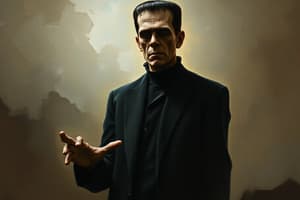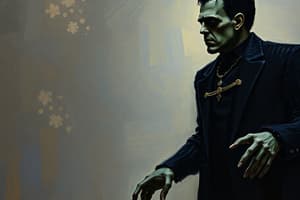Podcast
Questions and Answers
Who is the protagonist and narrator of Frankenstein?
Who is the protagonist and narrator of Frankenstein?
Victor Frankenstein
What is the name of the creature created by Victor Frankenstein?
What is the name of the creature created by Victor Frankenstein?
The Creature
Who is Robert Walton?
Who is Robert Walton?
An Arctic seafarer who nurses Victor back to health and records his story.
What is Alphonse Frankenstein's relationship to Victor?
What is Alphonse Frankenstein's relationship to Victor?
Who is Elizabeth Lavenza?
Who is Elizabeth Lavenza?
What happens to Henry Clerval?
What happens to Henry Clerval?
What is the significance of William Frankenstein's death?
What is the significance of William Frankenstein's death?
What was Justine Moritz wrongfully accused of?
What was Justine Moritz wrongfully accused of?
Who is Caroline Beaufort?
Who is Caroline Beaufort?
What did M. Waldman teach Victor?
What did M. Waldman teach Victor?
What does M. Krempe think of Victor's alchemical studies?
What does M. Krempe think of Victor's alchemical studies?
Who is Mr. Kirwin?
Who is Mr. Kirwin?
What are Romantic ideas about intuition?
What are Romantic ideas about intuition?
Match the following elements to Romanticism themes or characteristics:
Match the following elements to Romanticism themes or characteristics:
What does Gothic literature combine?
What does Gothic literature combine?
What does the term 'Frame Story' refer to?
What does the term 'Frame Story' refer to?
What are elements of Gothic horror?
What are elements of Gothic horror?
Who are archetypal characters in Gothic literature?
Who are archetypal characters in Gothic literature?
Flashcards are hidden until you start studying
Study Notes
Victor Frankenstein
- Central character and narrator with a deep fascination for science.
- Studied in Ingolstadt, where he unlocks the secret to creating life.
- Creates a monster, recoils from it in horror, and feels profound guilt.
- Believes he is responsible for the creature's actions and resulting deaths.
- Experiences illness and imprisonment, hinting at his mental anguish.
- Transforms from an innocent youth into a guilt-ridden individual.
The Creature
- Monster created by Victor, struggles to fit into human society.
- Feels isolated and betrayed, leading to a quest for vengeance against Victor.
- Responsible for key murders, including those of William and Elizabeth.
Robert Walton
- An Arctic explorer whose letters frame the story.
- Rescues Victor from the ice and records his narrative.
- Sends letters to his sister, which structure the novel.
Alphonse Frankenstein
- Victor's empathetic father who supports his scientific pursuits.
- Stands by Victor during his trials, emphasizing familial loyalty.
Elizabeth Lavenza
- Victor's adopted "cousin" who symbolizes the role of women in the novel.
- Primarily passive, waiting for Victor's attention, ultimately marries him.
- Her tragic death serves as a pivotal moment in Victor's story.
Henry Clerval
- Victor's devoted friend who provides companionship and care.
- Embodies cheerfulness in contrast to Victor’s darker mood.
- Falls victim to the monster, escalating Victor's despair.
William Frankenstein
- Victor's youngest brother, whose murder by the monster haunts Victor.
- His death intensifies Victor's feelings of guilt over creating the creature.
Justine Moritz
- Adopted by the Frankenstein family, wrongfully accused and executed for William's murder.
- Takes the blame to shield Victor, showcasing themes of guilt and innocence.
Caroline Beaufort
- Alphonse Frankenstein's wife and mother to Victor, taken in during hardship.
- Dies from scarlet fever, transmitting familial tragedy.
Beaufort
- Merchant and friend to Alphonse, Caroline's father, setting familial connections.
The DeLacey Family
- The family that the monster observes and learns from, representing societal rejection.
- Experiences both kindness from the blind De Lacey and cruelty from Felix and Agatha.
- Their rejection of the creature emphasizes the theme of isolation and acceptance.
M. Waldman and M. Krempe
- Waldman influences Victor’s scientific aspirations, dismissing antiquated alchemy.
- Krempe criticizes Victor's past studies and urges him to refocus on contemporary science.
Mr. Kirwin
- The magistrate accusing Victor of murder, highlighting societal judgment and legal struggles.
Romantic Ideas
- Prioritizes intuition and emotion over reason and logic.
- Centers the individual and explores nature as a symbol of the supernatural.
- Advocates for ideals and the pursuit of the betterment of life.
Elements of the Romantic
- Incorporates mythical storytelling and emphasizes democracy, freedom, and individualism.
Gothic Literature/Horror
- Mixes horror with romantic elements, paving the way for modern horror.
- Highlights nature's destructive power and uses atmospheric elements to convey mood.
Romanticism
- An influential artistic movement beginning in 18th century Europe, shaping literary landscapes.
Frame Story
- A narrative technique where an outer story encompasses the main plot.
Elements of Gothic Horror
- Features suspense, mystery, supernatural occurrences, and settings that evoke feelings of isolation.
- Incorporates architectural elements like haunted houses and castles to enhance themes of loneliness.
Archetypal Characters
- Utilizes classic character types, including the Byronic hero who embodies sensitivity, intelligence, and a self-centered nature.
Studying That Suits You
Use AI to generate personalized quizzes and flashcards to suit your learning preferences.




